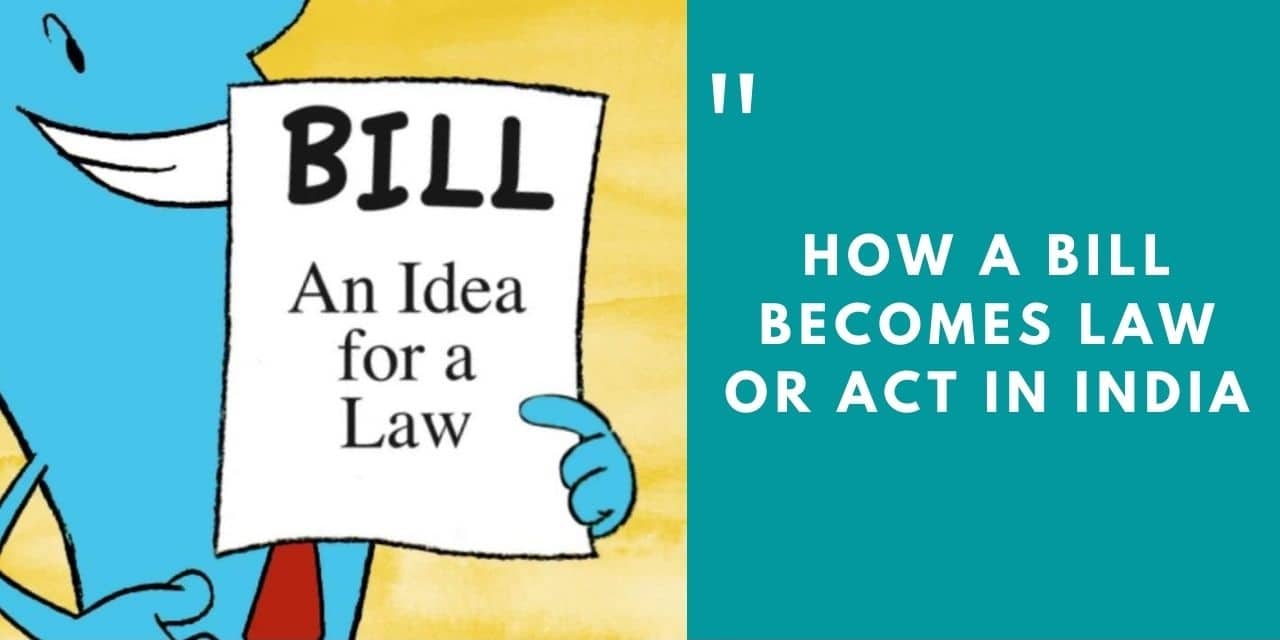
KNOW ABOUT HOW A BILL BECOME LAW IN INDIA
Law and society have co-existed throughout history. Society enacts laws for the welfare and protection of its citizens based on the period and situation. It would be disastrous for any kind of civilization if there were no laws because society would essentially become a jungle where people would fight over the most basic needs and anarchy may reign. Making laws is Parliament’s primary responsibility. All bills pertaining to proposed laws must be submitted for consideration by Parliament.
A bill, which is a draft statute, cannot be considered a law unless it has been approved by the President of India and both Houses of Parliament. Legislation is one of the most important instruments used by the government to uphold social order and protect its citizens. It establishes the obligations and privileges of individuals and authorities to whom the law applies, among other things. A law is useless, though, unless it is enforced or there is retaliation.
Types of Bills in India
- An ordinary bill can cover any topic, but not financial ones. An ordinary bill is introduced in the Parliament’s House of Representatives. This measure was proposed by a minister or private member. There isn’t a presidential proposal for a regular measure. Ordinary bills may be held for up to six months by the Rajya Sabha and may be amended or rejected. It is presented to the President for his approval by both Houses of Parliament in accordance with Article 111 of the Indian Constitution. Additionally, a joint sitting is permitted for these measures.
- Money Bill deals with issues pertaining to public finances. The Lok Sabha is where these bills are initially presented. They cover things like taxes, spending, and money allocation. The Rajya Sabha is not allowed to introduce Money Bills. All that is needed for this Bill to be approved is the Lok Sabha’s consent.
- The Finance Bill, which outlines all the legal changes required for the proposed tax reforms by the finance minister, is included in the Union Budget. Therefore, even if a measure addresses other concerns but only incorporates government spending, it will still be classified as financial. After being approved by the Lok Sabha (House of the People), the Finance Bill becomes the Finance Act.
- Whenever proposals are made to amend or add to the Indian Constitution, both houses can introduce the bills pertaining to constitutional amendments. For this Bill to become law, support from both chambers is required. A two-thirds majority vote of members is needed to pass the bill. Constitutional Amendment Bills need to be approved by half of the state legislatures.
How a bill is passed in Indian parliament?
The 5 stages of a bill becoming a law are as follows:
The Stage of “FIRST READING”
- A bill is introduced to a legislature and is given a first reading. An MP or Minister introduces the Bill at the first reading.
- In either of the houses, the bill may be presented. Its goals and provisions are explained by the minister or member of parliament.
- At this point, there is no voting or discussion.
The Stage of “SECOND READING”
- A bill draft is read a second time during the second reading stage of the legislative process.
- The Bill is scrutinized at the second reading. Parliamentarians debate and discuss the document’s provisions.
- Changes to the Bill may be proposed once it has been reviewed. Debates are part of this stage.
- The Members share their thoughts and worries regarding the Bill.
The Stage of “THIRD READING”
- The stage of the legislative process known as the third reading is when a measure is read through with all of the modifications and granted the legislative body’s final approval.
- The finished Bill is presented to the House for its third reading. MPs are free to discuss the Bill. MP is unable to alter anything at this time. They vote on the Bill following the debate.
- Parliamentarians cast votes on the bill. The bill is deemed passed in that particular house if the majority of the MPs present and voting favor it.
The Stage of “ PRESIDENTIAL ASSENT ”
- The official process by which the head of the Executive branch of government ends the legislative process by formally endorsing or consenting to an Act of Parliament is known as Presidential Assent once the houses have approved the bill and decided on its modifications.
- After that, the Bill is forwarded to the Indian President for approval. After reviewing the bill, the president has the option to approve it or reject it.
- The Bill becomes an Act if the President signs it into law.
The Stage of “COMMENCEMENT”
- An Act of Parliament frequently specifies that it will take effect on a date to be announced.
- In these situations, the Minister in charge of the matters the Act pertains to at the time normally sends out a legal notice informing the public of the Act’s effective date following Presidential Assent.
This is how a bill becomes a law in india. Before a bill becomes law, it must pass through a number of stages, which is essential for any community to survive and prosper. State legislation is passed using a procedure that is nearly identical to that of union legislation. Consequently, the Parliament does not use the government actions incorporated into the Constitution of India to enact legislation until the draft bills have been accepted by the Parliament. It appears that laws are currently in effect for a little longer than necessary. It’s time to expedite this process so that new laws that meet the demands of the country can be passed.



